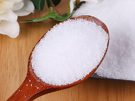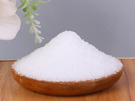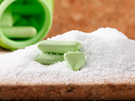Xylitol CM
Molecular formula: C5H12O5
Molecular weight: 294.31
CAS:22839-47-0
EINECS Number:245-261-3
E Number:E951
Product Introduction:
Aspartame is a low calorie sweetener with a sweetness about 200 times that of sucrose. It is synthesized from L-phenylalanine and L-aspartic acid. These two amino acids are the basic components of protein, just like the natural amino acids contained in daily foods such as milk, rice, meat, eggs and fish. Like other proteins, aspartame only brings natural substances to the human body. Aspartame tastes very close to sucrose and has no metal aftertaste. It is a very excellent low calorie sweetener. It is suitable for developing zero calorie or low calorie foods and beverages. Now more and more governments encourage the public to reduce sugar intake. Aspartame can play an important role in public health.
Scope of use:
Beverage, yogurt, dry mix, desktop sweetener, medicine, etc.
Specifications:
Superfine powder, fine powder, conventional powder, high density powder, particle, particle.
packing:
Net weight 25kg, 2-layer PE inner bag; Or as specified by the customer.
Product standard:
Gb1886.47, who and FAO standards, Codex Alimentarius, United States Pharmacopoeia, European Pharmacopoeia and British Pharmacopoeia.



Xylitol is a pentitol (five-carbon sugar alcohol) having meso-configuration, being derived from xylose by reduction of the carbonyl group. IXylitol is a naturally occurring five-carbon sugar alcohol found in most plant material, including many fruits and vegetables. Xylitol-rich plant materials include birch and beechwood. It is widely used as a sugar substitute and in "sugar-free" food products. The effects of xylitol on dental caries have been widely studied, and xylitol is added to some chewing gums and other oral care products to prevent tooth decay and dry mouth. Xylitol is a non-fermentable sugar alcohol by most plaque bacteria, indicating that it cannot be fermented into cariogenic acid end-products. It works by inhibiting the growth of the microorganisms present in plaque and saliva after it accummulates intracellularly into the microorganism. The recommended dose of xylitol for dental caries prevention is 6–10 g/day, and most adults can tolerate 40 g/day without adverse events.
t has a role as a sweetening agent, an allergen, a hapten, a human metabolite, an algal metabolite, a Saccharomyces cerevisiae metabolite and a mouse metabolite.
IUPAC
(2S,4R)-pentane-1,2,3,4,5-pentol
SMILES
C(C(C(C(CO)O)O)O)O






























